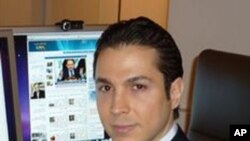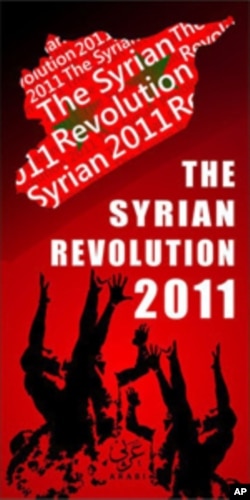Ribal al-Assad is the son of Rifaat, Hafez al-Assad's brother; and a first cousin to the current Syrian president, Bashar al-Assad. He has lived in exile since 1984. Two years before that, Hafez al-Assad instigated what has been called the single deadliest act of an Arab regime against its own people.
In February 1982, determined to crush a six-year armed insurgency by the Muslim Brotherhood and other Sunni groups, Syrian President Hafez al-Assad directed a full assault on the city of Hama, a stronghold of Sunni opposition. Tens of thousands of people died, most of them civilians.
Ribal al-Assad says that level of violence is a painful memory that Syrians would never want to see repeated. He now lives in London, where he is the Director of the Organization for Democracy and Freedom in Syria. He explained to VOA's Cecily Hilleary the memory of February 1982 is why opposition groups have been slow to mobilize Egypt-style demonstrations.
Ribal al-Assad: I don’t know if you’ve seen the logo that they [opposition groups] have used or the images that they were distributing on Facebook. The image they chose had a red, bloodish color; and they called it a day of rage. And they chose a day [February 5, 2011] that reminds people of the Muslim extremist armed uprising against the government in the late 70s, and the beginning of the 80s. People don’t want that memory.
They want change, but they don’t want a change that comes through fights and through violence and through blood. They should have been calling for peaceful demonstrations against the government.
Hilleary: Clearly by calling for a Day of Rage, there are those who are angry. What is it they are looking for?
Ribal al-Assad: There are a lot of people in Syria who are angry today. There’s no freedom of expression, no freedom of association, no freedom to complain about anything that goes on. People are hungry. So, that’s a very disastrous situation. Everybody is angry. Everybody wants change. But as I said, people don’t want to see the situation in Syria like it is in neighboring Iraq. Nobody wants to see that.
Hilleary: What is your group calling for?
Ribal al-Assad: We want a change in Syria and we want it to happen right now, but we don’t want a violent revolution, which would be very chaotic for Syria, because, as you know, a violent revolution in Syria would lead to chaos and public unrest, and we don’t want that. Syria has a lot of religions - like we have Christians in Syria, we have Muslims, we have Jews, we have among the Muslims themselves, we have Shi’a Muslims, Sunni Muslims, Alawites, Druze, Ismailis and many others. And we also have the Kurds in Syria, we have the Turkmen, we have the Cherkes - we have many different people in Syria and that would be very chaotic to try call for a violent revolution there.
Hilleary: Your cousin, President Al-Assad, recently announced a few reforms—he’s lessened restrictions on the internet. He’s calling for new media laws. Is this a sign that he’s nervous in the wake of Tunisia and Egypt?
Ribal al-Assad: Of course. If you’ve seen, the next day following what happened in Tunisia, the government started distributing help - money and food for 450,000 families. They lowered the price of mazut for heating, for example. On the 4th or on the 3rd, just before this Day of Rage, they have brought up the salaries by 17 or 19 percent. They were supposed to also lower the prices of medicines, so you see, of course they are nervous.
They have allowed Facebook and YouTube. You can access them easily in Syria. But this is not enough to say things, sell slogans - “Yeah, we have no problems in Syria. People have no dissent. People love them.”
If they love them, why don’t they make free elections? And they also say the country is not “fit” for democracy. Well, I have to tell them that it should not have to be deemed fit for democracy. A country becomes fit through democracy.
Hilleary: What is your prediction for the next few weeks and months as we see other governments in the area begin to tumble?
Ribal al-Assad: We’ll see. The government in Syria is very scared, as I told you before. Yesterday they lowered the taxes on some food products, and so that means that the government has done in the past week what they have failed to do in the past ten years. So we want them to move even faster and not just take some small steps.
We want them to take bigger steps and to call for a government of national unity, national reconciliation where all parties who believe in democracy - genuine democracy, not just some people who live abroad and who always think that democracy is just a vote, and the majority come, while the rest will have to pay the price.
Hilleary: What role, if any, could the U.S. play in helping to effect change?
Ribal al-Assad: The U.S. should support democracy and freedom everywhere. If you are for democracy, you have to support it everywhere. If you are for freedom and human rights, you have to support it everywhere. You cannot be [a] hypocrite about it.
Hilleary: And if you had any message to deliver to your cousin [President Bashar al-Assad], would you? And what would it be?
Ribal al-Assad: It would be, “Change or you will be changed.” I’ve been saying this for awhile now.
Initially, VOA misspelled the names of President Bashar al-Assad and Rifaat al-Assad. We regret the error.













